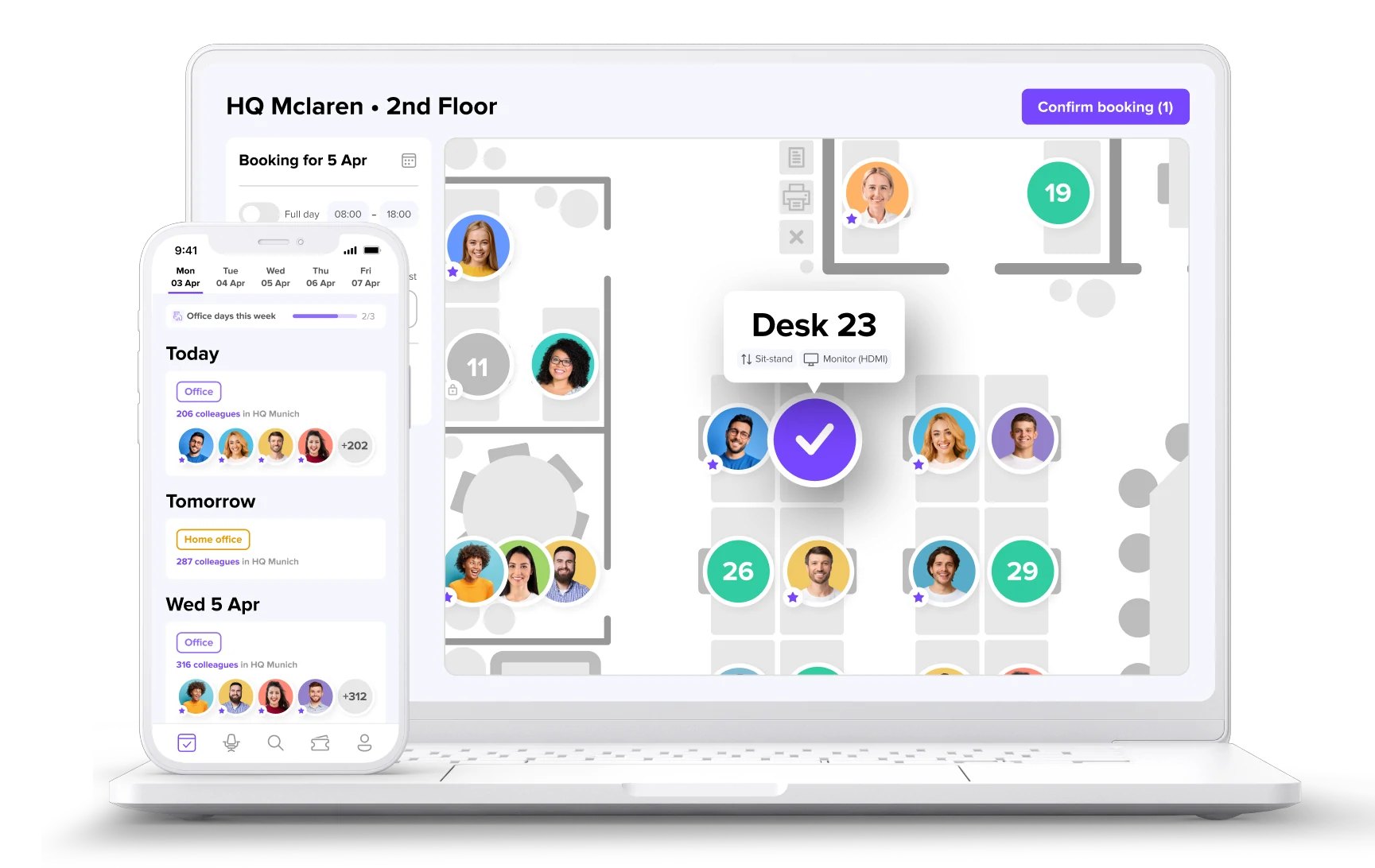
Why business technology matters: driving efficiency, growth & security
Using business technology increases efficiency by automating tasks, reduces costs, reinforces cybersecurity, and enhances collaboration across flexible teams. Examples range from CRM systems to smart office technology and workplace management software. By leveraging business technology strategically, companies can streamline workflows, improve the employee experience, support hybrid work models, and gain a competitive advantage.

What is business technology?
Business technology is the umbrella term for all the digital tools, platforms, and solutions that streamline operations, boost productivity, and drive innovation across organizations. It spans everything from CRM systems and advanced data analytics to automated workflows, desk booking software, and smart furniture that improve daily efficiency.
🎬 Learn how we can support your hybrid work environment in this less than two-minute video about the features of the deskbird app!
Why is business technology important?
In today’s digital era, adopting the right technologies ensures flexible teams can collaborate seamlessly, processes remain optimized, and companies gain the insights they need to make data-driven decisions. By integrating these tools strategically, businesses not only enhance performance and employee experience but also stay competitive in rapidly evolving markets.
1. Increasing efficiency and productivity
Business technology boosts efficiency by automating repetitive tasks, reducing human error, and streamlining processes. Real-time data analysis enables faster, more informed decision-making, while collaboration and project management tools keep distributed teams aligned. Together, these solutions accelerate project delivery, improve quality, and maximize employee productivity.
2. Optimizing resources and reducing costs
Digital tools help organizations cut expenses because they automate manual processes, minimize labor costs, and improve resource management. For instance, cloud computing lowers IT overhead with scalable solutions, and data analytics uncovers cost-saving opportunities by eliminating inefficiencies. This results in leaner operations and a healthier financial strategy.

3. Reinforcing cybersecurity and reducing human error
Modern business technology strengthens cybersecurity with encryption, multi-factor authentication, and real-time threat detection while reducing risks tied to human error. Automated systems handle error-prone tasks like data entry, and advanced solutions such as secure access service edge (SASE) ensure safe, continuous access to corporate resources across locations.
4. Streamlining workflows and operations
Integrated systems unify communication and data across departments, creating smoother workflows. Tools like room booking software prevent double bookings and optimize office space use, while calendar integrations provide visibility into resources. These solutions ensure efficient coordination, reduce bottlenecks, and support seamless transitions between remote and in-office work.
5. Enhancing competitiveness
Technology gives businesses a competitive edge by enabling automation, real-time communication, and data-driven strategies. Automating low-value tasks frees employees for strategic work, while e-commerce platforms expand market reach. With the ability to adapt quickly to change, companies using technology can innovate faster and outperform competitors. McKinsey estimates that the long-term AI opportunity could add about $4.4 trillion in productivity growth from corporate use cases.
📆 Start a free trial of the deskbird app to give your employees more flexibility with workspace booking and week planning while saving costs!
How does business technology impact the employee experience?
Business technology enhances the employee experience by removing dull, repetitive tasks, streamlining workflows, and enabling seamless communication across distributed teams. It empowers staff to focus on meaningful work, strengthens collaboration in flexible environments, and helps hybrid employees stay connected and engaged.
1. Automating repetitive and low-impact tasks
Automation improves the employee experience by offloading monotonous work like data entry or routine customer inquiries to tools such as chatbots and scheduling systems. This frees up time for employees to focus on strategic, high-value tasks that require creativity and critical thinking, boosting job satisfaction, personal growth, and overall contribution to the business.
2. Streamlining and speeding up processes
Digital platforms centralize projects, deadlines, and communication, cutting down on time wasted searching for information or coordinating tasks. Automating functions like scheduling or reporting accelerates workflows, reduces frustration, and allows employees to prioritize strategic work, creating smoother operations and higher efficiency across the organization.

3. Improving communication among flexible teams
Collaboration tools such as Slack or Zoom and real-time document platforms keep flexible teams connected regardless of their location or time zone. These tools enable instant communication, keep projects moving forward, and foster a shared culture, ensuring distributed employees work together as cohesively as if they were actually in the same office.
4. Connecting hybrid employees
For hybrid workers, business technology replicates in-office interactions through virtual whiteboards, shared digital workspaces, and informal chat channels. These tools build camaraderie, encourage spontaneous collaboration, and help remote staff feel integrated into company culture, strengthening engagement and team cohesion despite reduced on-site presence.
👉 Learn more about the importance of belonging in the workplace!
What are common examples of business technology in the workplace?
The term “business technology” encompasses both physical tools and digital solutions that help companies operate more efficiently, improve communication, and support employee productivity. From hardware like computers and smart furniture to software such as project management platforms and AI automation, these technologies are now essential parts of modern workplaces.
- Computer systems: desktops, laptops, tablets, and smartphones that serve as the backbone of daily work.
- Communication hardware: microphones, headsets, and VR devices enabling seamless interaction across locations.
- Office technology: smart sensors, digital ergonomic furniture, and network routers that enhance comfort and connectivity.
- Cybersecurity systems: solutions to protect company data and defend against digital threats.
- Desk booking software: tools that optimize workspace use in hybrid and flexible offices.
- Communication platforms: instant messaging and video conferencing tools like Slack, MS Teams, or Zoom.
- Data storage solutions: cloud platforms that provide secure, scalable access to files and information.
- Project management tools: apps that centralize tasks, deadlines, and collaboration.
- CRM software: systems for managing customer relationships and tracking sales pipelines.
- Accounting solutions: digital tools to streamline invoicing, payroll, and financial reporting.
- Automation and AI technology: systems that reduce repetitive work and enable data-driven decision-making.
How to leverage business technology for maximum impact
To get the most out of business technology, companies need to adopt tools that directly enhance efficiency, empower employees, and support sustainable growth. Here’s how to leverage today’s most impactful technologies effectively.
1. Work smarter with AI assistants
Use AI to analyze data, predict trends, and automate repetitive tasks. Apply AI-driven analytics for smarter decision-making and resource planning, freeing your team to focus on strategy and innovation. Studies show that generative AI tools boost business user productivity by an average of 66% on real-world tasks.
2. Automate processes to boost efficiency
Deploy automation to handle routine tasks, cut costs, and scale operations. Leverage these tools to reduce errors and give employees more time for high-value work like problem-solving and customer engagement.

3. Use VR tools for training and collaboration
Adopt VR for immersive training, product prototyping, and virtual meetings. This reduces travel, accelerates learning, and enhances creativity in both design and teamwork.
4. Make your office smarter with IoT solutions
Install smart office technology like intelligent lighting, climate control, and occupancy sensors to improve comfort, save energy, and optimize space usage. IoT-connected devices also streamline maintenance and prevent costly downtime.
5. Prioritize sustainable tech investments
Choose green technologies like renewable energy, waste reduction systems, and eco-friendly materials. This not only reduces costs and regulatory risks but also strengthens your brand reputation and long-term resilience.
💜 Read our complete guide about sustainability in the office!
Why is workplace management software like deskbird an essential business technology?
Workplace management software is essential for hybrid and flexible teams because it optimizes office use, improves the employee experience, and reduces costs. By combining desk and room booking, analytics, and automation, solutions like deskbird ensure employees always have the right space, while companies gain data to make smarter decisions.
Supports hybrid employees
deskbird makes hybrid work seamless by letting employees plan their in-office days in advance and book desks or meeting rooms that match their needs. This eliminates uncertainty, reduces administrative overhead, and helps teams coordinate their schedules more effectively.
Improves the employee on-site experience
Workplace management software enhances the in-office experience by giving employees autonomy to choose the spaces that work best for their tasks. Clear visibility of where colleagues are working fosters smoother collaboration, while simplified booking processes remove friction from the workday.
Ensures employees always have the right workspace
Desk booking software ensures employees can always reserve the workstation they need. Booking a quiet desk or collaboration zone in advance avoids frustration when offices are crowded, enabling smooth transitions from remote to on-site work and supporting focus and productivity.
Provides insights into actual office use
The office analytics in deskbird provide insights into occupancy patterns, desk and room usage, and overall efficiency. These insights guide office design based on real employee behavior, improve satisfaction, and enable agile work practices. They also support smarter decisions on real estate and resource allocation.
Reduces office costs through space optimization
By enabling hot desking and monitoring space use, deskbird helps companies reduce the number of desks per employee, cut underutilized areas, and lower rent, utilities, and maintenance expenses. This creates a leaner, more cost-effective workspace that adapts to fluctuating occupancy.
The role of business technology in shaping the future of work
Business technology is no longer optional. It’s a driver of efficiency, innovation, and competitiveness. By adopting the right tools, companies can streamline operations, improve communication, and make smarter, data-driven decisions. Solutions like deskbird demonstrate how workplace management software translates these benefits into practice, from optimizing office space to supporting flexible work.
Leveraging business technology effectively means creating smarter, more adaptive workplaces where employees thrive and revenue grows. Ready to see the impact firsthand? Request a free demo of the deskbird app and discover why business technology matters in practice by getting a glimpse into the future of an organized, agile, and tech-empowered work environment!
Sources:
Frequently Asked Questions
What is the difference between business tools and business technology?
Business tools are individual applications or resources used to perform specific tasks, like a project management app or accounting software. Business technology is broader. It refers to the entire ecosystem of tools, platforms, and systems working together to streamline operations, boost efficiency, and drive growth across the organization.
What risks do companies face if they delay investing in business technology?
Delaying investment in business technology can lead to inefficiencies, higher operating costs, and weaker competitiveness. Employees may become frustrated with outdated systems, while security vulnerabilities increase. In rapidly evolving markets, falling behind on technology adoption often means losing talent and customers and losing out on long-term growth opportunitiess.
How does business technology support sustainability goals?
Technology supports sustainability by reducing energy waste, optimizing office space, and digitizing processes that replace paper-heavy workflows. Smart sensors, remote work tools, and green tech investments lower carbon footprints. Companies that integrate sustainable technology not only cut costs but also strengthen brand reputation with environmentally conscious customers and employees.

Bring your workplace into the future
- Digitize office management with one integrated platform
- Automate admin tasks and reduce operational friction
- Make data-driven decisions with real-time workplace insights








%20(1).webp)
